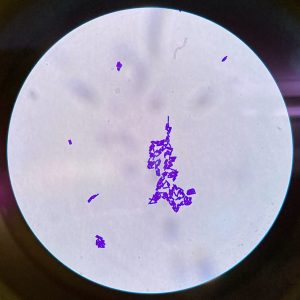Through my research this summer, I hope to gain more confidence in my knowledge and abilities in the lab. Being in a research setting is very different from being in General Biology or Microbiology lab. You can be very confident in what you are learning in those labs, however, research requires a different way of thinking that’s beyond just performing certain techniques for a grade. The switch in thinking is quite overwhelming, but I know it takes time and practice to nurture and, luckily, I’m not the only one in the same position. Because there is five of us in our research team I’m certain that we’ll all be there for and help one another. Gaining more lab confidence will definitely help me in my career path because I’m aiming to get my Ph.D. and that’ll mean lots of time spent in a lab doing research.
Our first experiment was to see if our bacteria, Caulobacter crescentus, could grow in the water that’s available to us. We tested four different kinds of water: filtered (MQ), tap, deionized (DI), and office tank. The cultures incubated overnight to let the bacteria grow. Initially, we didn’t get much growth. We only found bacteria in the media made with MQ and tap water through a simple stain, but it turned out that there was some sort of contamination in the MQ water because a species that is not C. crescentus grew. We did, however, get C. crescentus to grow in the tap water media. After one more night of incubation we did see growth in all the tubes.


Christina Alfano ’22
Biochemistry, Cell and Molecular Biology
Hi Christina,
The research you’re doing sounds really intriguing and I’m glad you shared some photos of your findings! I love seeing anything under a microscope. The way you mentioned getting into a different mindset to conduct literal research made me think about how I (in the Humanities) tend to conflate anything done in a typical biology lab with any other kind of independent research– which is obviously wrong of me to do! But it’s good that you brought this up, because it made me realize that there is a big difference here. It sounds like you’re in “uncharted territory” with regard to research and that must be so thrilling to take the initiative to step out of conventional curricular kind. Best of luck moving forward!
I see so many similarities between our internships in research at Scranton, and am happy you found an opportunity that aligns with your future career goals. The sense of community in the lab you had mentioned is one of my favorite things about doing research at Scranton; I love that there are plenty of people to lean on and bounce ideas off of. I too agree that the switch in thinking required when working in the lab is rather challenging, but it definitely gets easier with time. I’m excited to see what you do with your research, and best of luck with the rest of the summer!
Christina, it’s amazing that you are getting experience doing research that will be similar to your future pursuing your PhD. I appreciate how you clearly and concisely explain your research in a way that even a non-STEM person like myself can understand. I’m sure this clarity in writing will contribute to success in your future. I hope you enjoy the rest of your summer of research!
Hi Christina!
Your research looks very interesting! Although I have not conducted microbiological research, I have experienced the same learning curve in my research in psychology, and don’t worry, it gets so much better! Lab confidence is definitely a difficult skill, but I am positive your expertise will grow throughout the rest of the summer. I wish you the best of luck!